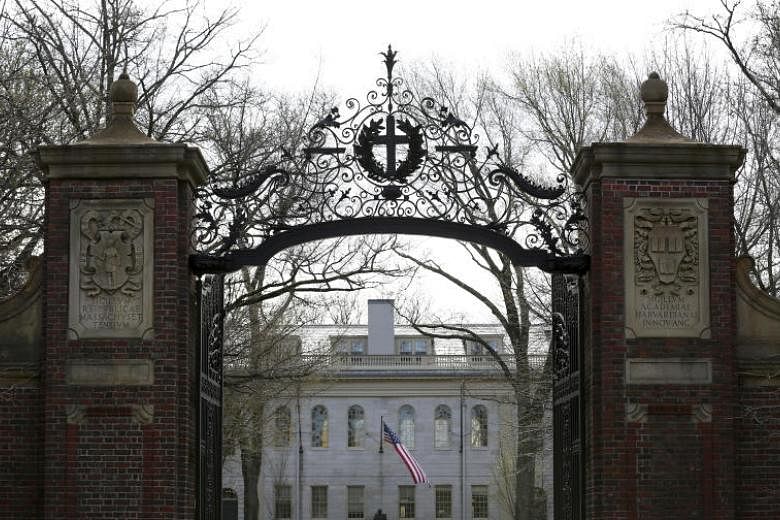WASHINGTON (NYTIMES) - The Justice Department lent its support Thursday (Aug 30) to students who are suing Harvard University over affirmative action policies that they claim discriminate against Asian-American applicants, in a case that could have far-reaching consequences for the use of affirmative action in college admissions.
In a statement of interest, the department supported the claims of the plaintiffs, a group of Asian-Americans rejected by Harvard. They contend that Harvard has systematically discriminated against them by artificially capping the number of qualified Asian-Americans from attending the school to advance less-qualified students of other races.
"Harvard has failed to carry its demanding burden to show that its use of race does not inflict unlawful racial discrimination on Asian-Americans," the Justice Department said in its filing.
The filing said that Harvard "uses a vague 'personal rating' that harms Asian-American applicants' chances for admission and may be infected with racial bias; engages in unlawful racial balancing; and has never seriously considered race-neutral alternatives in its more than 45 years of using race to make admissions decisions."
In its filing, the Justice Department argued that the court should deny Harvard's request to dismiss the case before trial.
The government said that Supreme Court rulings require that universities considering race in admissions meet several standards. They must define their diversity-related goals and show that they cannot meet those goals without using race as a factor in admissions decisions.
The department argued that Harvard does not adequately explain how race factors into its admissions decisions, leaving open the possibility that the university is going beyond what the law allows.
"Harvard has failed to show that it does not unlawfully discriminate against Asian-Americans," the Justice Department said in a statement Thursday.
The Harvard case, which was brought by an anti-affirmative-action group called Students for Fair Admissions, is seen as a test of whether a decades-long effort by conservative politicians and advocates to roll back affirmative action policies will ultimately succeed.
That push has broad support from President Donald Trump.
The Department of Education and Justice Department said in July that the administration was abandoning Obama-era policies that asked universities to consider race as a factor in diversifying their campuses and would favour race-blind admissions instead.
Officials from both departments said that the Obama administration had used guidelines to circumvent Congress and the courts to create affirmative action policies that went beyond existing law. The Trump administration contends that its stance on affirmative action adheres to the letter of the law and the opinions of the courts.
"The Supreme Court has determined what affirmative action policies are constitutional, and the court's written decisions are the best guide for navigating this complex issue," Education Secretary Betsy DeVos wrote in a statement when the guidance rollback was announced.
Civil rights leaders and others argue that this stance effectively undermines decades of policy progress that created opportunity for minorities, and that it has thrown race-conscious admissions into jeopardy.
The department typically files statements of interest in cases that it feels directly impact the federal government's interests.
"As a recipient of taxpayer dollars, Harvard has a responsibility to conduct its admissions policy without racial discrimination by using meaningful admissions criteria that met lawful requirements," Attorney General Jeff Sessions said in a statement.
In briefs filed in support of Harvard at the end of July, students and alumni said that they "condemn" the plaintiffs' "attempt to manufacture conflict between racial and ethnic groups in order to revive an unrelenting agenda to dismantle efforts to create a racially diverse and inclusive student body through college admissions."
"It's alarming that Trump is aligning himself with anti-civil rights activist Edward Blum in this subversive attempt to say that civil rights protections cause discrimination," said Jeannie Park, the head of the Harvard Asian American Alumni Alliance, referring to the founder of Students for Fair Admissions.
"Asian-Americans have long benefited from policies to increase equal opportunity and still do. Our fear is that Harvard's admissions system is just the latest target in a larger fight to roll back protections for people of color in all fields, including government and business."
At the heart of the case is whether Harvard's admissions staff hold Asian-Americans to higher standards than applicants of other racial or ethnic groups, and whether they use subjective measures, like personal scores, to cap the number of Asian students accepted to the school.
"It turns out that the suspicions of Asian-American alumni, students and applicants were right all along," Students for Fair Admissions said in a court filing.
"Harvard today engages in the same kind of discrimination and stereotyping that it used to justify quotas on Jewish applicants in the 1920s and 1930s."
Harvard, which admitted less than 5 per cent of its applicants this year, said that its own analysis did not find discrimination. The university has also noted that Blum has lost previous challenges to affirmative action policies.
A trial in the case has been scheduled for October.
If it winds its way to the Supreme Court, it could be heard by Judge Brett Kavanaugh, Trump's nominee for the vacant seat once held by Justice Anthony Kennedy.
The case could have far-reaching implications for the nation's colleges and universities that consider race in their admissions processes.
The Justice Department is pursuing its own investigation into Harvard's admissions policies based on a complaint it received.

